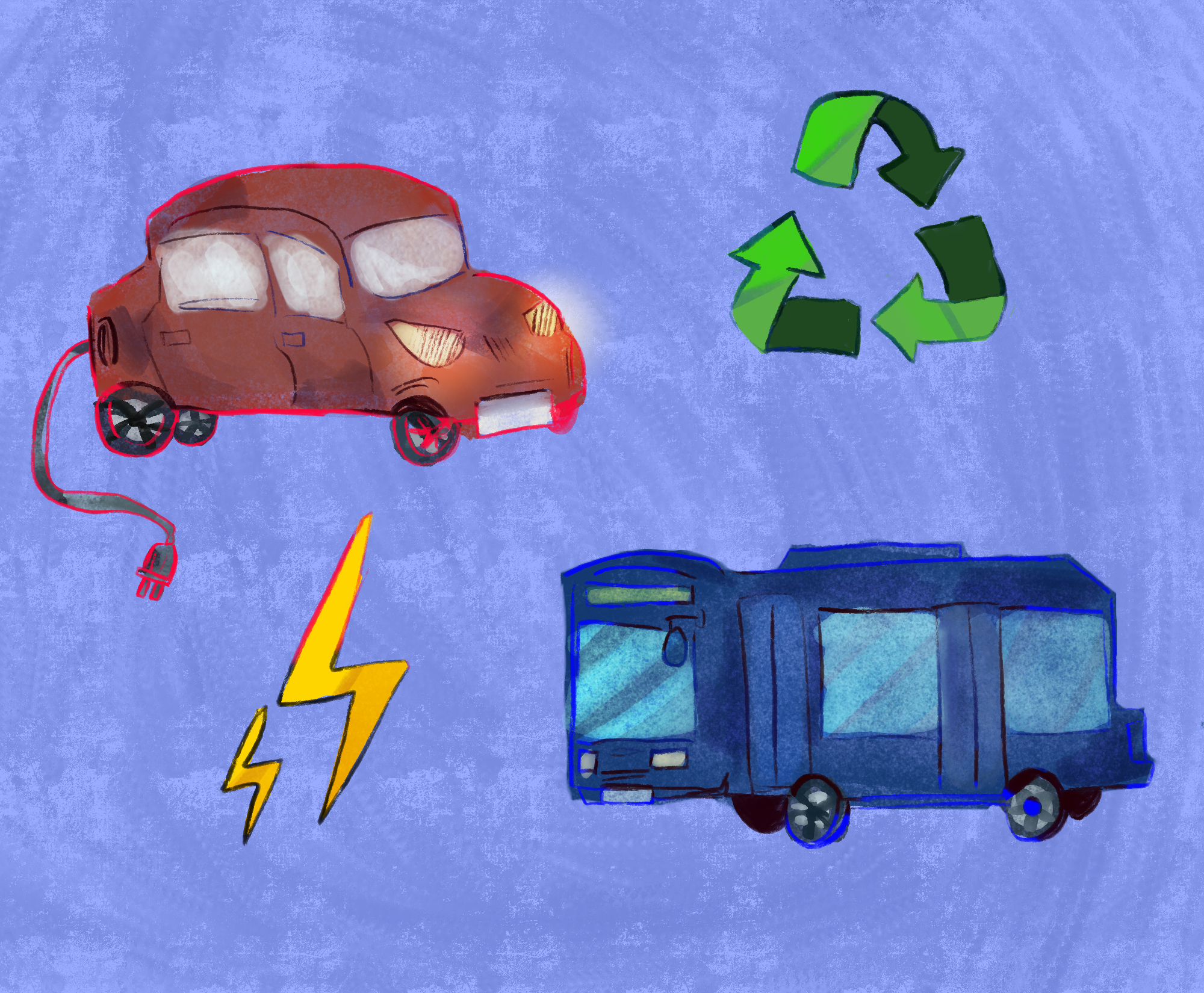Sustainable and Equitable Transportation
Madeline Shani ’25
Julia Liu ’26
The revolutionary inventions of transportation, such as cars, buses, and trains, have improved the human quality of life yet brought grave environmental issues. Sustainable transportation, such as electrical vehicles (EVs) and public transportation, could help solve these problems. However, access to these forms of transit lacks equity and inclusion.
Electric vehicles have been a growing phenomenon all around the world. EV stands as an archetype for sustainable transit and has made a massive impact on the transportation industry. In December of 2023, President Biden boosted access to electric vehicles nationwide. His administration began the EV Acceleration Challenge, which spreads education, increases the accessibility of charging ports, and produces more EVs in total (TWH, 2023). If more people become educated on the advantages and functions of EVs, they will be more likely to invest in one in the future. Improving the availability of charging ports for all Americans will make it easier for people to maintain these vehicles. Consequently, this will increase the market, and sustainable impacts will simultaneously grow.
That said, EVs are still more expensive than most alternative transit options. This primarily stems from the expense of building an electric vehicle versus a standard gas vehicle. To combat this, the Biden Administration has cut down on the prices of electric vehicles by 20% from last year; thus, sales have spiked along with them (TWH, 2024). Nonetheless, work must still be done to make EVs accessible for everyone.
Lastly, Public Transportation plays a key role in making transit sustainable. As more people share only one vehicle at a time, we decrease greenhouse gas emissions. For example, around 37 million tons of carbon dioxide are saved by public transportation per year (KCATA).
Misfortune is seen as 45% of Americans do not have the privilege to utilize public transportation (ITDP). Essentially, due to racial and class inequality in our society, working-class people of color demographically have the least access to public transportation. People who work atypical hours do not have schedules that align with public transportation, and people with lower incomes do not have the privilege of paying fares while paying for other life essentials (Jenkins, 2020). In addition, rural, low-income communities often do not have geographic access to train or bus stations, which forces them to rely on private gas vehicles as their only form of transport. To succeed in sustainable transportation, it must fit the needs of all people from diverse backgrounds. In 2022, Connecticut enacted Free Fares, consequently making bus rides free in Connecticut. However, for economic reasons, in 2023, buses began charging fares again (CT Public 2023). This proves an unwavering contradiction between the American economy and the needs of its citizens. We must dive deeper into the effect that sustainable transportation has on our planet while also looking into the equity that our transportation offers.
References
.AAR. December 2023 Freight Railroads are Part of the Solution to Climate Change
https://www.aar.org/wp-content/uploads/2023/06/AAR-Climate-Change-Fact-Sheet.pdf
Jenkins, Wesley. (Urban). October 6th, 2020 The Unequal Commute
https://www.urban.org/features/unequal-commute
KCATA. Environmental Benefits of Public Transit
Polansky, Chris. (CT Public) April 18th 2023 Free fares are over for CT bus riders. Who's to blame?
https://www.ctpublic.org/news/2023-04-18/free-fares-are-over-for-ct-bus-riders-whos-to-blame
The White House. December 2023. ACT SHEET: Biden-Harris Administration Takes Action to Accelerate
America’s Clean Transportation Future https://www.whitehouse.gov/briefing-room/statements-releases/2023/12/14/fact-sheet-biden-harris-administration-takes-action-to-accelerate-americas-clean-transportation-future/
The White House. January 2024. FACT SHEET: Biden-Harris Administration Announces New Actions to Cut
Electric Vehicle Costs for Americans and Continue Building Out a Convenient, Reliable, Made-in-America EV Charging Network. https://www.whitehouse.gov/briefing-room/statements-releases/2024/01/19/fact-sheet-biden-harris-administration-announces-new-actions-to-cut-electric-vehicle-costs-for-americans-and-continue-building-out-a-convenient-reliable-made-in-america-ev-charging-network/#:~:text=As%20part%20of%20President%20Biden's,in%2DAmerica%20EV%20charging%20network.
